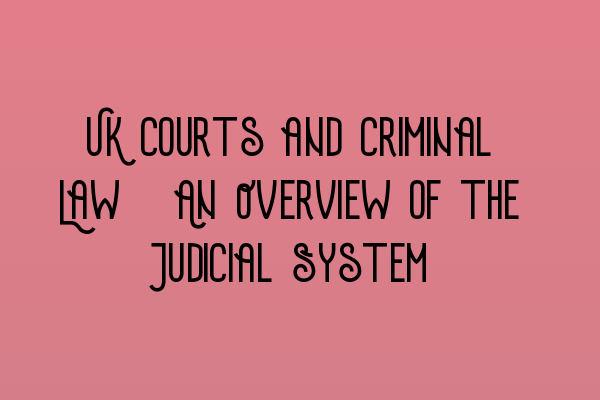UK Courts and Criminal Law: An Overview of the Judicial System
Welcome to the SQE Criminal Law & Practice Law blog! In this article, we will provide an in-depth overview of the UK courts and the criminal law system. Understanding the structure and workings of the judicial system is crucial for anyone involved in criminal law, whether you’re a solicitor, barrister, or aspiring legal professional. So, let’s dive right in!
The UK judicial system is known for its three-tiered structure, consisting of the Magistrates’ Court, the Crown Court, and the Appellate Courts. Each court plays a vital role in the administration of justice and ensuring that criminal cases are handled fairly and efficiently.
Magistrates’ Court:
The Magistrates’ Court is often the first point of entry for most criminal cases in the UK. It deals with less serious offenses, known as summary offenses, and some either-way offenses, which can be tried either in the Magistrates’ Court or the Crown Court. The Magistrates’ Court is typically presided over by a panel of lay magistrates (also known as justices of the peace) or a professional district judge. They assess evidence, determine guilt or innocence, and impose sentences within their jurisdictional limits.
To better understand the intricacies of the Magistrates’ Court, check out our article on Decoding Criminal Evidence Rules: A Detailed Analysis.
Crown Court:
The Crown Court has jurisdiction over more serious criminal offenses, such as indictable offenses or those that have been committed for trial by the Magistrates’ Court. Crown Courts are presided over by experienced judges who oversee the trial process, including sentencing if the defendant is found guilty. Unlike the Magistrates’ Court, the Crown Court has a jury of 12 members that determines the verdict based on the evidence presented.
To stay up-to-date with the latest developments in UK criminal law and enhance your legal expertise, read our article on Updates in UK Criminal Laws: Staying Informed and Prepared.
Appellate Courts:
Appellate Courts are the highest level of courts in the UK and handle appeals from both the Magistrates’ Court and the Crown Court. The two main Appellate Courts are the Court of Appeal and the Supreme Court.
The Court of Appeal hears appeals against convictions, sentences, or decisions made by lower courts. It is divided into two divisions: the Criminal Division, which deals with criminal appeals, and the Civil Division, which deals with civil matters. The Court of Appeal is presided over by Lord Justices of Appeal or Lady Justices of Appeal.
The Supreme Court is the highest court in the UK, having replaced the Appellate Committee of the House of Lords in 2009. It hears select appeals, including those of general public importance and cases involving a significant legal point. The Supreme Court consists of justices, including the President and Deputy President, who are independent of the legislative and executive branches of government.
Interested in attending workshops and seminars to expand your knowledge and expertise in criminal practice? Check out our article on Workshops and Seminars on Criminal Practice: Expanding Your Expertise.
Conclusion:
The UK courts and criminal law system are essential pillars of justice. Each court serves a unique purpose, ensuring that criminal cases are adjudicated fairly and in accordance with the law. Whether you’re a solicitor, barrister, or aspiring legal professional, understanding the workings of the UK judicial system is crucial for a successful career in criminal law.
For a deeper dive into fraud and financial crimes in the UK, don’t miss our article on Deep Dive into Fraud and Financial Crimes in the UK.
If you’re studying for the SQE Criminal Law exam, consider enhancing your study group experience with our article on Enhancing Your SQE Criminal Law Study Group Experience.
We hope this overview has provided valuable insights into the UK courts and criminal law system. Stay tuned for more informative articles and updates from SQE Criminal Law & Practice Law UK!
